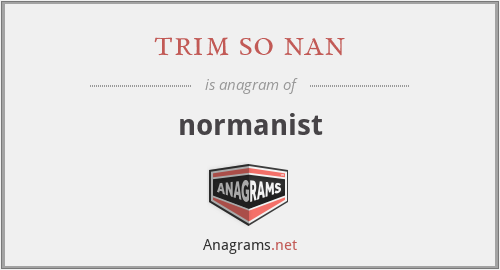What anagrams are available for normanist?
This page is about an anagram for the word trim so nan that can be used in word games, puzzles, trivia and other crossword based board games.
trim so nan
Translation
Find a translation for trim so nan in other languages:
Select another language:
- - Select -
- 简体中文 (Chinese - Simplified)
- 繁體中文 (Chinese - Traditional)
- Español (Spanish)
- Esperanto (Esperanto)
- 日本語 (Japanese)
- Português (Portuguese)
- Deutsch (German)
- العربية (Arabic)
- Français (French)
- Русский (Russian)
- ಕನ್ನಡ (Kannada)
- 한국어 (Korean)
- עברית (Hebrew)
- Gaeilge (Irish)
- Українська (Ukrainian)
- اردو (Urdu)
- Magyar (Hungarian)
- मानक हिन्दी (Hindi)
- Indonesia (Indonesian)
- Italiano (Italian)
- தமிழ் (Tamil)
- Türkçe (Turkish)
- తెలుగు (Telugu)
- ภาษาไทย (Thai)
- Tiếng Việt (Vietnamese)
- Čeština (Czech)
- Polski (Polish)
- Bahasa Indonesia (Indonesian)
- Românește (Romanian)
- Nederlands (Dutch)
- Ελληνικά (Greek)
- Latinum (Latin)
- Svenska (Swedish)
- Dansk (Danish)
- Suomi (Finnish)
- فارسی (Persian)
- ייִדיש (Yiddish)
- հայերեն (Armenian)
- Norsk (Norwegian)
- English (English)
Definition
What does normanist mean?
- normanist
- The Rusʹ (Old East Slavic: Рѹсь; Belarusian, Russian, Rusyn, and Ukrainian: Русь; Old Norse: Garðar; Greek: Ῥῶς, romanised: Rhos) were a people in early medieval eastern Europe. The scholarly consensus holds that they were originally Norsemen, mainly originating from present-day Sweden, who settled and ruled along the river-routes between the Baltic and the Black Seas from around the 8th to 11th centuries AD. In the 9th century, they formed the state of Kievan Rusʹ, where the ruling Norsemen along with local Finnic tribes gradually assimilated into the East Slavic population, with Old East Slavic becoming the common spoken language. Old Norse remained familiar to the elite until their complete assimilation by the second half of the 11th century, and in rural areas, vestiges of Norse culture persisted as late as the 14th and early 15th centuries, particularly in the north.The history of the Rus' is central to 9th through 10th-century state formation, and thus national origins, in eastern Europe. They ultimately gave their name to Russia and Belarus, and they are relevant to the national histories of Russia, Ukraine and Belarus. Because of this importance, there is a set of alternative so-called "Anti-Normanist" views that are largely confined to a minor group of East European scholars.
Embed
Citation
Use the citation below to add this anagram to your bibliography:
Style:MLAChicagoAPA
"trim so nan." Anagrams.net. STANDS4 LLC, 2024. Web. 17 May 2024. <https://www.anagrams.net/term/9071202>.



Discuss this normanist anagram with the community:
Report Comment
We're doing our best to make sure our content is useful, accurate and safe.
If by any chance you spot an inappropriate comment while navigating through our website please use this form to let us know, and we'll take care of it shortly.
Attachment
You need to be logged in to favorite.
Log In